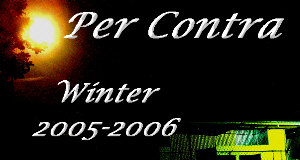
Randall Brown
Randall Brown - I like the aggression of the form, its brevity forcing me to take a stand. There's no wishy-washiness here.
BT - What do you find most challenging in writing flash fiction?
RB - That feeling of completion--that the piece isn't a part of a larger work. Desire drives narrative into being--the desire of the writer, characters, readers, and the text itself. Texts desire an ending; readers desire that the ending have a self-contained meaning. So, in flash, there's the text's urgency to reach its ending, a Dionysian passion to burn, extinguish; and then there's the Apollonian need for meaning. It's tough, balancing these two opposing desires.

BT - How do you go about writing a flash fiction piece? Does it begin with characters, ideas, moods, a story or all of the above? Or is there something we've not mentioned?
RB - Something in the world attracts my attention. For example, the first flash I wrote originated in a CNN article about a man who spent his life swallowing coins until eventually his stomach burst. He had a disease, pica, Latin for magpie, a bird that'll eat anything. Pregnant women, the report said, often suffer from the disorder. What would a pregnant woman eat? And why? What if she thought she had to feed the baby? But again why? Well, she suffered previous miscarriages. And the husband, I'm sure he's pissed about the whole thing. No. Too easy. Make him supportive. Make her eat bugs, as if her baby were a tiny bird. Make him go out into the world to gather them for her. So, in short, it begins with that arresting image or fact and then I ponder it for a week or so, piecing it together, looking for the odd twists or angles. I don't write anything for that week. And then--flash--it bursts out and blazes (hopefully) across the page.
BT - How does the structure of the piece take shape? Do you edit for structure or does the structure flow from the story or your writing? How do you get from the first word to the last?
RB - I'm fairly traditionalist structure-wise. Almost all of my pieces begin at that moment when characters' lives will be transformed. This life-changing incident razes characters' previous world. Now, in the chaos of what's left, they work to reconstruct their selves, their lives, their desires. At the end, there's some sense of resolution, even if it's temporary. Hegel's tragic vision--that there's no gain without a commensurate loss--informs most of my endings. Resolution and insights comes with a cost. To find one's heart's desire is to lose something equally important.
BT - In your opinion, what is the most vital element in writing?
RB - Writing. I think of the moment when I first answered the question "What are you?" with "I'm a writer." I felt ready to answer that question as such not because of publication successes, contest wins, or the like. I had become disciplined. I wrote almost daily. I workshopped pieces. I gave feedback to other writers. Stories underwent a dozen or so rewrites. I read fiction and essays to get better.
BT - Who are your favorite authors?
RB - Most influential have been Frost, Tennessee Williams, Fitzgerald. The author whom I've read the most--Stephen King. I still can't sleep with the blinds open for fear of looking out and seeing, waiting to come in, a floating vampire child. Joseph Young is doing some amazing things with the flash form. Myfanwy Collins has amazingly merged poetic lyricism with the narrative demands of flash. Patricia Parkinson's Canadian Chick blog has a great collection of micros. Pamela Painter's awesome. Kathy Fish rocks the flash house. Jeff Landon's piece in Quick Fiction--exquisite. Nance Knauer's got a powerful voice at work in her fiction. A piece by Lisa Glatt in Zoetrope--All Story is a must-read. Steve Almond, I like a lot.
BT - Where, or in what, do you find ideas or inspiration for your work?
RB - The world. Yesterday, my fly fishing guide described the time he spent as a caretaker of a house in Virginia that was known as The House the Indians Couldn't Burn Down. A great title, I thought. And then this sentence came to me: She took me into the woods and told me she'd show me The House the Indians Couldn't Burn Down. What will they find? I don't know. I love that about writing. All I know is these two kids are going into the woods, the dark, haunted woods of children's tales. I can't wait to write their story. - End
And we can't wait to read it.